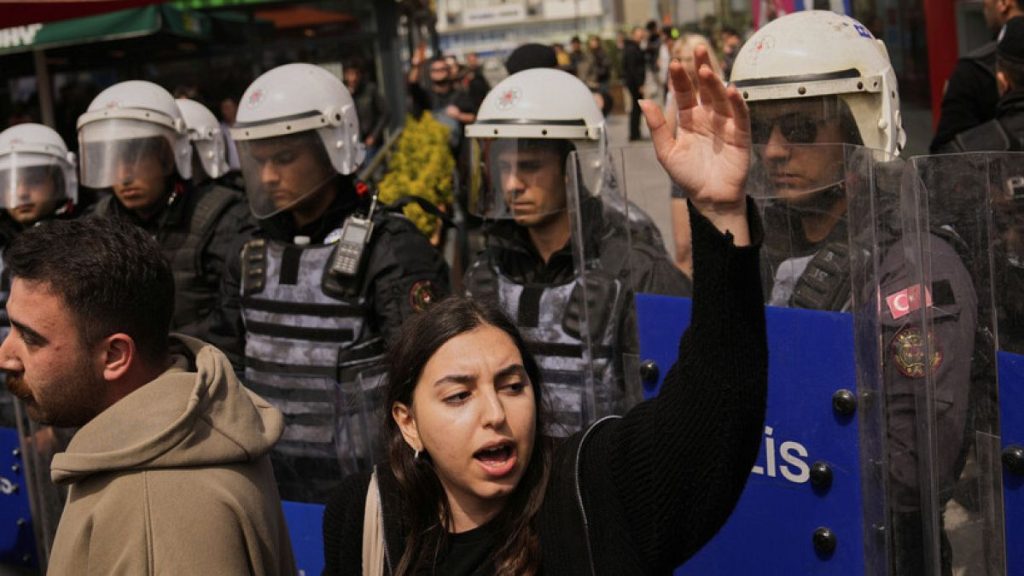In a significant court hearing on Friday, dozens of defendants, including journalists and university students, appeared in a courtroom in Istanbul regarding their participation in anti-government protests. These demonstrations erupted following the controversial arrest and imprisonment of Ekrem Imamoglu, the city’s opposition mayor, signaling an intense political climate in Turkey. As the situation unfolds, the defendants face charges related to participating in banned protests and resisting police enforcement, amidst claims that their rights have been violated.
| Article Subheadings |
|---|
| 1) Background of the Protests |
| 2) Details of the Court Hearing |
| 3) The Reactions of Defendants and Families |
| 4) Government’s Stance on the Judiciary |
| 5) Implications for Turkish Politics |
Background of the Protests
The protests in Turkey have roots in the arrest of Ekrem Imamoglu, the opposition mayor of Istanbul, who was taken into custody on 19 March 2023. His imprisonment came just days later, following corruption charges that many view as politically fueled attempts to undermine his challenge to President Recep Tayyip Erdogan‘s long-standing rule. Throughout Erdogan’s administration, there has been a consistent narrative concerning civil liberties, with various reports indicating an erosion of democratic principles. The catalyst for the protests was not merely the legal troubles faced by Imamoglu, but the larger sentiment against what is perceived as increasing authoritarianism in Turkey.
Details of the Court Hearing
On the opening day of the court proceedings, a total of 189 individuals, primarily university students, were summoned to defend themselves against accusations of attending unlawful protests. These demonstrations, which occurred nationwide, represent the largest expression of dissent seen in over a decade. Charges against the defendants included failing to comply with police orders and participating in unauthorized gatherings, with some facing additional allegations related to weapon possession. Notably, the case involving multiple journalists has been separated from the larger trial, indicating a potentially distinct legal treatment for media personnel involved in the events.
The Reactions of Defendants and Families
As the trial proceeds, the defendants have expressed a feeling of unjust treatment. Among them is Derin Doga Kus, a student from Istanbul University who was detained from her home and spent 18 days in Silivri prison. Echoing sentiments shared by many, she stated, “This is not a legal process; it is a process where the law is trampled on.” Her experience highlights the deep personal impact these events have had on students and their families, many of whom participated in ongoing vigils calling for the release of those detained. Families have rallied outside court and jailed locations, voicing demands for acquittals and support for their children’s rights, emphasizing that their actions were in line with democratic practices.
Government’s Stance on the Judiciary
In the backdrop of these events, the Turkish government continues to assert that its judicial system operates independently. Officials maintain that accusations of political motivations behind the arrests and trials are unfounded. Such claims come amidst widespread skepticism from both national and international observers regarding the impartiality of Turkey’s legal framework. The narrative crafted by the government stands in stark contrast to the experiences and stories relayed by the defendants and their families, creating a landscape of tension and mistrust. This dichotomy raises questions about the future of political dissent in Turkey and the state of civil rights.
Implications for Turkish Politics
The ongoing trials and protests surrounding the case against Imamoglu and the associated defendants have significant implications for the political landscape in Turkey. As public sentiment swells against what many perceive as an anti-democratic crackdown, these events could potentially galvanize further resistance against the ruling government. The notion of a politically motivated judiciary raises alarm regarding the future of Turkey’s democratic practices, challenging the legitimacy of its electoral processes and governance. As the situation evolves, observers will be closely monitoring the responses of both the government and the populace, anticipating how these events may shape the trajectory of political discourse in Turkey moving forward.
| No. | Key Points |
|---|---|
| 1 | The protests were sparked by the jailing of opposition mayor Ekrem Imamoglu. |
| 2 | A total of 189 defendants are facing charges related to participating in the protests. |
| 3 | Multiple journalists were also tried, but their cases were separated from the main trial. |
| 4 | Families of defendants have protested outside of court, demanding acquittal and discussing the impact on students. |
| 5 | The Turkish government maintains that its judiciary operates independently, denying claims of political motivations. |
Summary
The ongoing court trial surrounding the protests in Turkey highlights the growing tensions between the government and the populace amid claims of political oppression. The situation is emblematic of a larger struggle for democracy and civil liberties in the country, with families stepping forward in defense of their rights. As hearings progress and public dissent continues, the viability of Turkey’s democratic institutions remains under scrutiny.
Frequently Asked Questions
Question: What triggered the recent protests in Turkey?
The protests were triggered by the arrest and imprisonment of Ekrem Imamoglu, the opposition mayor of Istanbul, who was viewed as a political challenger to President Recep Tayyip Erdogan.
Question: How many people are facing charges related to the protests?
A total of 189 individuals, primarily university students, are facing charges for participating in banned protests and not complying with police orders.
Question: What is the position of the Turkish government on the judiciary’s independence?
The Turkish government maintains that its judiciary operates independently and that the court processes are free from political motivations.


